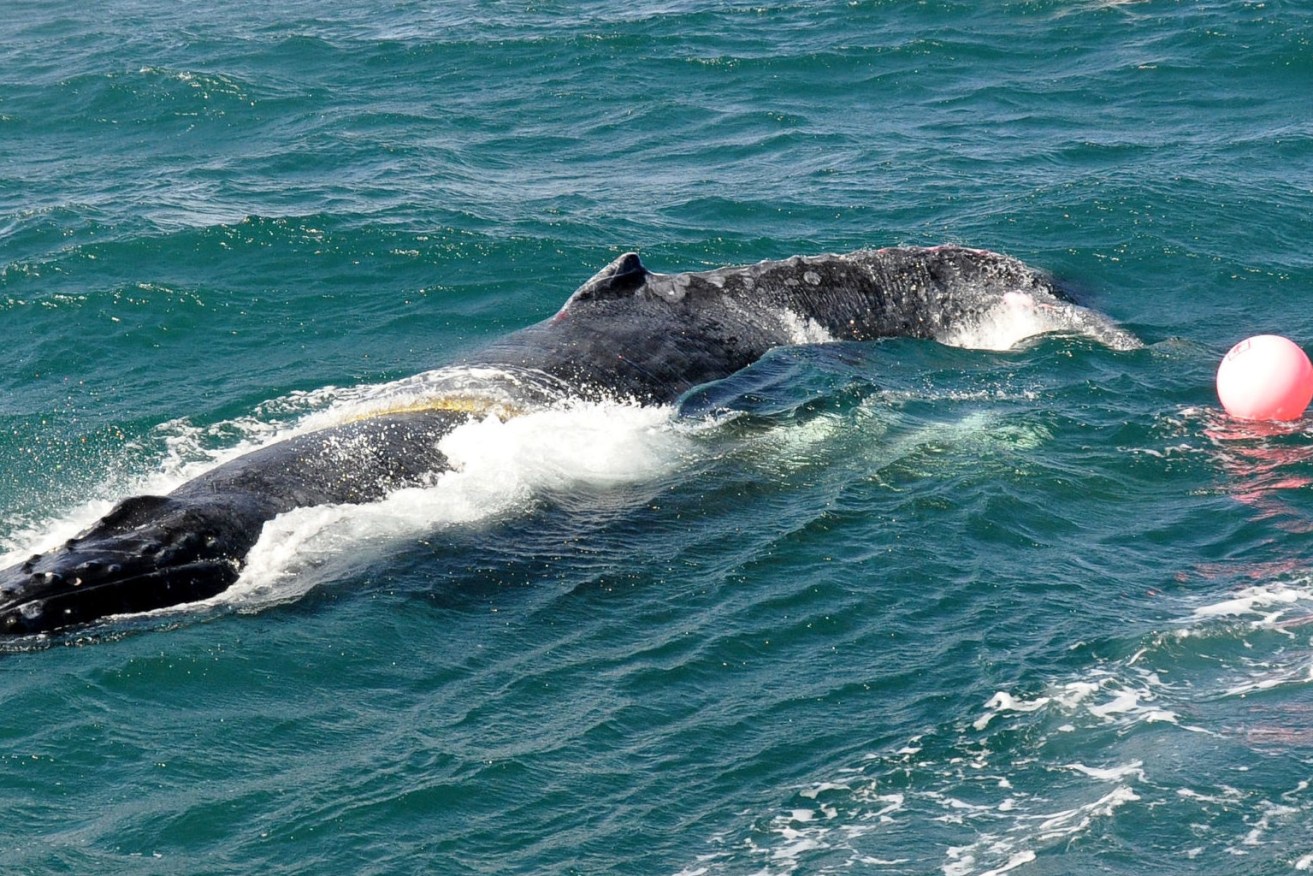Drones and ‘smart drumlines’ may replace Coast shark nets, save whales during migration
Some shark nets on the Gold Coast are expected to be replaced with “scientifically monitored trials” of smart drumlines and drones, under a compromise proposal to be announced by the State Government to prevent whales being trapped in nets.


A 10m humpback whale tangled in a shark net off Main Beach on the Gold Coast. (Photo: AAP Image/Sea World)
A delegation of whale researchers delivered a petition containing more than 105,000 signatures to Fisheries Minister Mark Furner on Wednesday calling for shark nets that were “designed to kill” to be lifted for a few weeks over winter whale migration season.
The petition called for the nets to be replaced with “modern and better technology” to ensure swimmer safety.
The researchers want four of the Gold Coast’s 11 nets lifted – at Burleigh Heads, Kirra and Currumbin on the southern Gold Coast and Main Beach further north. They say the four nets are responsible for 70 per cent of whale entanglements.
Four whales have been trapped in shark nets off the Gold Coast this season, including three in three days from Friday.
A whale mother and calf were trapped in nets at Main Beach on Friday, followed by another whale caught in nets at Surfers Paradise on Sunday. All three whales were freed.
The three entanglements followed a whale rescue by Gold Coast man, Django, who was dubbed “tinny man” after diving from his tinny to free the first trapped whale of the season at Burleigh Heads in May.
Griffith University whale researcher Dr Olaf Meynecke said scientific evidence showed whale mothers and calves rested in Gold Coast waters, putting them at increased risk of being tangled in shark nets.
“We’ve got all this scientific evidence that there are a few nets that are particularly bad for whales because they keep catching them because this is where mothers and calves are resting,” Meynecke said.
“Local people know the nets aren’t a safe barrier anyway and they don’t reduce the risk of shark interaction.”
Meynecke said a scientific working group advising the government’s Shark Control Program had proposed trial replacements for shark nets on the Gold Coast in March.
“That hasn’t happened, and now we’ve got another four whales caught in shark nets,” Meynecke said.
“It really shows we need to do something about this.”
Furner on Wednesday confirmed a State Government announcement on shark net alternatives was imminent.
He said he had been briefed by the Fisheries Department about replacing shark nets with drumlines.
“We want to make the point that in terms of the Shark Control Program, lives matter,” Furner said.
“We will address the science behind the briefing I received from the Department about looking at the value of replacing shark nets with drumlines. We listen to science.”
He said Queensland’s Shark Control Program had recorded only one fatality at a Shark Control Program beach since 1962.
“The Palaszczuk Government has committed $1 million per year over four years to examine innovations in our Shark Control Program,” he said.
“We expect to make announcements on scientifically monitored trials soon.”
Gold Coast Mayor Tom Tate, however, confirmed he remained steadfastly against the removal of shark nets until there was more evidence alternatives would keep swimmers safe.
“If I’m sitting there on the beach and I’ve got my family out there swimming and they get bitten by a shark, well, hell, that’s a bit more concerning than some of these whales,” Tate said.
He said it was unlikely the city would replace shark nets with alternative technology, given the number of shark attacks in northern NSW at beaches that were not protected by shark nets.
“Just look a bit further south where there’s no shark nets, there’s shark bites,” he said.
“Until we have a proven technology I want to see the nets remain.
“If you can trial the new technology and it works, we’ll have a crack at putting it in.”
Gold Coast surfer Rob Pedretti was the most recent victim of a fatal shark attack in northern NSW when he suffered a bite to the back of his thigh as he was surfing with a friend off South Kingscliff Beach on Sunday, June 7.
This article is supported by the Judith Neilson Institute for Journalism and Ideas













